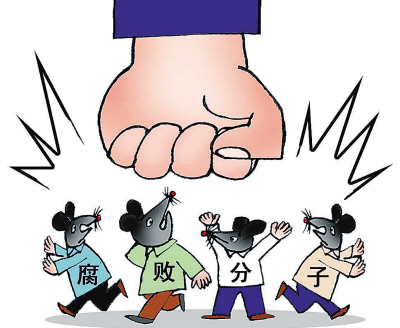

 |
The American television drama series “House of Cards” features U.S. politicians' ruthless pragmatism and manipulation in political struggle. As inappropriate as it is, some people still compare China's anti-corruption campaign to “House of Cards”, insinuating anti-corruption is a tool for power struggle to discriminate against dissidents. Is this just alarmism?
Corruption is the natural enemy of modern politics. Some people refer to the anti-corruption campaign as a “political need”, or another type of “conflict” among the politicians. It does make sense if this “political need” means to purify the governing party and keep a closer relationship with the people, and “conflict” means fighting against corruption and controlling its spread.
Action is the best response to these rumors. The CPC Central Disciplinary Committee and Ministry of Supervision set up an anti-corruption website, a mobile app, and an account on WeChat to improve the transparency of their work by inviting people to supervise and report. Instead of playing “House of Cards”, facts have shown that the anti-corruption campaign in China is the terminator of any “House of Cards” scheme.
If the anti-corruption campaign in China really is a so-called “power struggle”, then how can the fact that even officials of grassroots villages have also been investigated for graft be explained? Since the 18th National Congress of the CPC, countless rumors have collapsed on themselves. “Safe landing” fell to the ground as retired officials also have to be investigated, “punish someone as a warning to others” collapsed after several “big tigers” also got caged for corruption. All the achievements resulting from the anti-corruption campaign so far are more than enough evidence of the determination of China fighting official graft.
The reason that “anti-corruption is a power struggle” still has a market to spread out is mostly because of information asymmetry, rumors from some ulterior motivations and the mentality of the social transformation period. Different from literature and arts, the key of politics lays in public benefits and prudence. While for the public, instead of spreading hearsay news irresponsibly, people should use their right of speech and question events properly when it comes to politics; for functional governmental departments, the openness of discipline inspection work still needs to be further propelled, and they should also be more concerned with the public’s doubt and response to them in a timely manner.
It is an unquestioned fact that the anti-corruption campaign has fostered people’s trust and support for the Party. Fallacies can neither cover the accomplishment achieved from the campaign, nor stop the firm steps in strengthening Party discipline.
This article is edited and translated from 人民日报评论员观察:反腐哪有什么“纸牌屋”, Source: People's Daily.
 A foreign girl explains what China should be proud of
A foreign girl explains what China should be proud of Chinese navy's air-cushioned landing craft in pictures
Chinese navy's air-cushioned landing craft in pictures Chinese pole dancing master opens class in Tianjin
Chinese pole dancing master opens class in Tianjin PLA holds joint air-ground military drill
PLA holds joint air-ground military drill Charming female soldiers on Xisha Islands
Charming female soldiers on Xisha Islands Beautiful skiers wear shorts in snow
Beautiful skiers wear shorts in snow Getting close to the crew on China's aircraft carrier
Getting close to the crew on China's aircraft carrier Chinese stewardess celebrate test flight at Nansha Islands
Chinese stewardess celebrate test flight at Nansha Islands Pentagonal Mart becomes the largest vacant building in Shanghai
Pentagonal Mart becomes the largest vacant building in Shanghai Top 20 hottest women in the world in 2014
Top 20 hottest women in the world in 2014 Top 10 hardest languages to learn
Top 10 hardest languages to learn 10 Chinese female stars with most beautiful faces
10 Chinese female stars with most beautiful faces China’s Top 10 Unique Bridges, Highways and Roads
China’s Top 10 Unique Bridges, Highways and Roads Rent a womb
Rent a womb Go princess gone
Go princess gone Sex goes high-tech
Sex goes high-tech Scholars call for a ban on churches in Confucius’ hometown
Scholars call for a ban on churches in Confucius’ hometownDay|Week